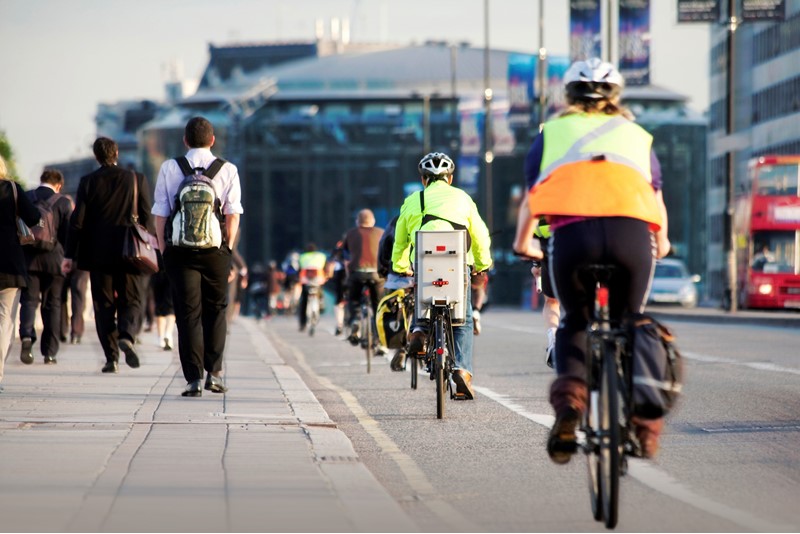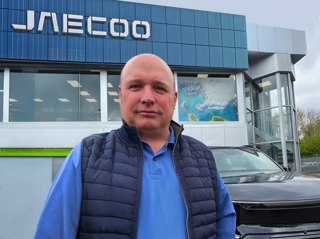
It’s no secret that exercise is good for you, but persuading employees to swap their cars to either cycle or walk to work, or for business journeys, can be beneficial to employers as well.
The Transport for London (TfL) report Walking & Cycling: the economic benefits says people who are physically active take 27% fewer sick days each year than their colleagues, while 73% of employees who cycle felt it made them more productive.
Getting staff on their bikes or walking – collectively known as active travel – also reduces emissions and congestion, meaning there are plenty of incentives for an organisation to promote it.
“If you are a fleet manager, the key thought should be ‘what are the priorities for my organisation?’,” says Tim Steiner, local and sustainable transport market director at transport consultancy Systra.
“Some will be pushing carbon reduction under corporate social responsibility, others will be targeting employees’ health, while others might have more internal issues such as car parking problems because they want to expand their site but their car park is already full.”
Active travel can tackle all these issues – 10 bikes can comfortably fit into one car parking bay, so the more staff who cycle to work, the less pressure there is on spaces – but many employers are unnecessarily wary of it, he says.
“I’ve seen lots of organisations that go on talking about active travel as if it’s something entirely radical like they are introducing jetpacks or something, but almost everyone can walk or cycle,” adds Steiner.
“They might not be able to walk to work or be able to walk during the course of their work because they might live miles away or their job means they need a vehicle, but how many of us don’t walk somewhere during the course of a week? A large proportion of the population also cycles regularly.
“So if you are talking about promoting active travel for some journeys, it’s not radical.
“Obviously, if you have got a 20-mile journey and loads of stuff to carry, then saying to someone they should walk is daft, but for local journeys to work or during the course of work, then why not walk or cycle, because a lot of us are doing that at the weekend or after work anyway.”
Active travel solutions
A number of organisations have offered active travel solutions to employees for several years.
Gateshead Council, for example, promotes walking as an ideal form of travel between council facilities, while it has also had a pool of electric and standard bikes for staff use since 2011.
Stirling Council introduced its employee travel plan in 2009, and this saw the local authority buy eight pool bikes along with helmets, panniers, lights, bicycle locks and tabards. It has also developed support facilities, such as showers, lockers, and covered and open bike parking.
“(Managing the equipment) is where fleet managers are really helpful,” says Steiner. “People, like me, from an active travel side, we get our knickers in a right twist about trying to manage fleets of bikes, but fleet managers are great at that because if you are good at managing something that has got four wheels or more, you can manage something that has got two wheels. You’ve got to check that bikes are in a reasonable condition, know who’s got them, when they are coming back, all those sorts of things that fleet managers do all the time, so that is a real opportunity for them to get involved.”
Assessed for competency
Stirling Council services its bikes twice a year to ensure they are in good working order, while employees are assessed for competency and are required to sign the terms and conditions of use before being allowed to use the bicycles.
Steiner says many employers will provide or offer cycle training to staff to ensure the employer is meeting its duty of care responsibilities.
“It’s quite cheap to get in a specialist cycle trainer for a day – maybe a couple of hundred quid – to run courses for a lot of people,” he adds. “If you do that once or twice a year, the duty of care issue can be covered.”
Providing the right equipment for staff is key to encouraging active travel, says Steiner, but promoting it is also vitally important.
“There are lots of organisations that have bought 100 bikes, spent tens of thousands of pounds on them, and then it hasn’t been promoted properly, no one uses them and then they become a waste of money,” he adds. “But start something small, get the promotion right, get the leadership right, and you should be away.”
Stirling Council promotes active travel to employees through its staff intranet, posters and a weekly newsletter, while Gateshead Council gives information outlining the mental health and well-being benefits of walking, as well as the fact that the activity is cost- and carbon-neutral.
Organisations can also encourage use of bikes by offering staff a pence per mile rate in the same way they would be compensated for using a car.
“Typical rates might be 5p or 10p per mile,” adds Steiner. “The management of an organisation could be saying ‘we want to encourage you to cycle sometimes instead of driving and we recognise the organisation is saving money as well, so we want to give some of that saving back to the employee’.”
Team meetings are also a good opportunity to promote active travel, and it could be that staff who regularly cycle offer help to get less confident colleagues back on their bikes.
“More than anything, you need senior management buy-in to say this is a good thing and, when you haven’t got far to go and when it’s not hosing with rain, walking or cycling is a great way to get to work or to get around during the course of the day,” says Steiner.




















Login to comment
Comments
No comments have been made yet.